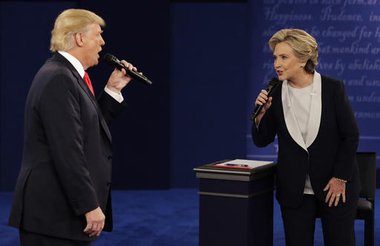Policy Prescriptions: Clinton and Trump on guns

By LISA MARIE PANE
ATLANTA (AP) — If there was ever an issue underscoring the differences between Donald Trump and Hillary Clinton, it's gun rights.
Trump, the GOP presidential nominee, is a lifelong member of the National Rifle Association who believes the Second Amendment provides an absolute right to buy and own firearms. Democrat Clinton has advocated limiting the sales and possession of guns.
Both claim their approach as an answer to the gun violence that is a top concern of Americans — from terror attacks and mass shootings to the proliferation of guns on city streets.
Trump's acceptance speech at the Republican convention heavily backed law enforcement in a tough-on-crime message to address gun violence. "An attack on law enforcement is an attack on all Americans," he said.
Clinton and her convention showcased the stories of gun-violence victims, from former congresswoman Gabby Giffords, critically injured by a gunman in 2011, to mothers whose children were killed. "If we're serious about keeping our country safe, we also can't afford to have a president who's in the pocket of the gun lobby," she said.
The next president will have significant influence over how the nation's gun laws are applied through an appointment to the U.S. Supreme Court to fill the vacancy created with the death of Justice Antonin Scalia.
Here is a summary of their proposals:
___
BACKGROUND CHECKS
Under federal law, background checks for firearms purchases must be completed within three days or the sale goes ahead without it. Since the online system began in 1998, nearly 246 million background checks have been performed, and in that time nearly 1.4 million purchases have been denied, the FBI says. Most denials were because of a prior criminal history that made the person ineligible to buy a firearm. Relatively few — just a little over 25,000 — were denied because of a mental health issue.
TRUMP: Supports keeping the current system but making it more effective by ensuring that states provide criminal and mental health records so the system has the most up-to-date and accurate information. He criticizes efforts to expand background checks, saying it ignores that criminals rarely purchase their firearms through legal channels.
CLINTON: Advocates expanding background checks to include the sale of firearms at gun shows or via the internet. She also pledges to close the so-called "Charleston loophole," named for the shooting deaths of nine people at a South Carolina church during Bible study, which allows a gun sale to take place if the background check is not completed within the required three days.
___
ASSAULT WEAPONS BAN
For a decade, the sale of so-called assault weapons, or AR-style semi-automatic rifles, and large-capacity magazines was banned. The ban expired in 2004 and such weapons remain much maligned among advocates for gun control because of their use in high-profile mass shootings, including the 2012 Sandy Hook massacre, which left 20 elementary school children and six school employees dead, and the shooting in June at a gay club in Orlando, Florida, which left 49 dead and 53 wounded.
TRUMP: Opposes efforts to reinstate the ban, which had been put in place in 1994 under the administration of Bill Clinton. "Law-abiding people should be allowed to own the firearm of their choice," Trump says in his position paper on the Second Amendment. "The government has no business dictating what types of firearms good, honest people are allowed to own."
CLINTON: Has supported reinstating the ban on assault weapons. "Military-style assault weapons do not belong on our streets," Clinton has said.
___
CONCEALED-CARRY PERMITS
TRUMP: Advocates a national system making a concealed-carry permit valid in all 50 states.
CLINTON: Hasn't spelled out views on such permits. She has advocated raising the age to legally own a firearm from 18 to 21.
___
GUN-FREE ZONES
Federal law makes it illegal to carry a firearm in a school zone. There are exceptions, including states that allow firearms on school property if they are kept in a locked vehicle. Some states also carve out an exception for people who have a concealed-carry permit. The issue of gun-free zones also arose in the immediate aftermath of last year's mass shooting at a military recruiting center and reserve center in Chattanooga, Tennessee, in which four Marines and a Navy sailor were killed.
TRUMP: Has said gun-free zones only invite attacks and has vowed to scrap them at military bases. "Banning our military from carrying firearms on bases and at recruiting centers is ridiculous. We train our military how to safely and responsibly use firearms, but our current policies leave them defenseless," Trump says in talking points posted on his campaign website.
CLINTON: Supports retaining gun-free zones at schools. "Parents, teachers and schools should have the right to keep guns out of classrooms, just like Donald Trump does at many of his hotels."
___
Copyright 2016 The Gayly - 10/26/2016 @ 7:06 a.m.





